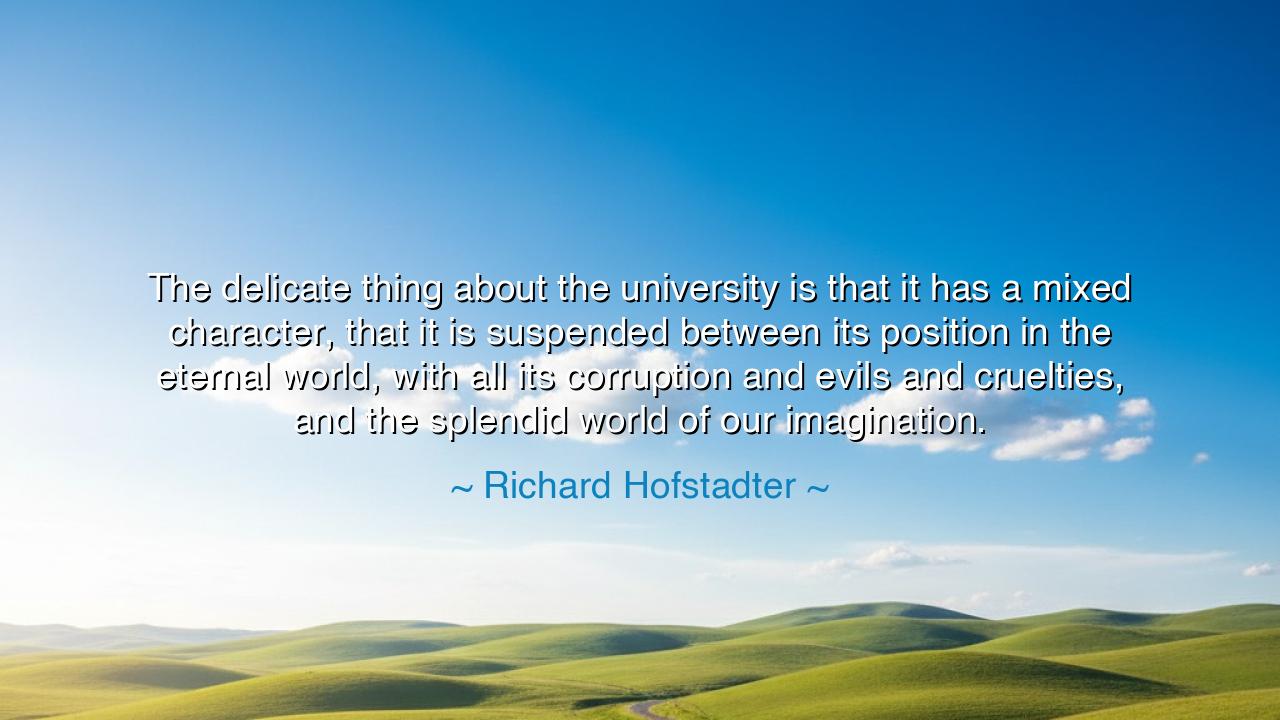
The delicate thing about the university is that it has a mixed
The delicate thing about the university is that it has a mixed character, that it is suspended between its position in the eternal world, with all its corruption and evils and cruelties, and the splendid world of our imagination.






In the words of Richard Hofstadter, “The delicate thing about the university is that it has a mixed character, that it is suspended between its position in the eternal world, with all its corruption and evils and cruelties, and the splendid world of our imagination.” These words speak not merely of the university as a building or an institution, but as a living being — a temple of the human spirit, standing at the crossroads between earthly imperfection and divine aspiration. The university, in Hofstadter’s vision, is not only a place where knowledge is stored, but where souls are tested — tested by the darkness of reality and the radiance of ideas. It is, as the ancients would say, both the forge and the flame, where the raw iron of ignorance is shaped into the bright sword of understanding.
In its mixed character, the university mirrors the condition of humanity itself. For just as the human heart beats between love and ambition, humility and pride, so too does the university exist between the eternal and the temporal. Within its walls, one may find the scent of old books mingled with the faint smoke of burning desires — the wish to know, to rise, to conquer, to be remembered. And yet, it is also within those same walls that envy, vanity, and corruption creep quietly, as ivy over stone. Thus, Hofstadter reminds us: the university is delicate, for it lives in tension — between truth and power, between wisdom and worldliness.
Consider the story of Socrates, the philosopher of Athens, who walked among the young men of the city as their teacher. His classroom was not of marble but of air and open sky. He questioned the noble and the humble alike, seeking not wealth, but truth. Yet the very city that raised him — the eternal Athens, proud of its learning — condemned him to death, fearing his questions more than its own ignorance. Here lies the same paradox Hofstadter speaks of: that the pursuit of knowledge is bound to the world’s evils. The same city that imagined the splendid world of ideas could not bear the weight of truth’s fire when it threatened their comfort. Thus, even the birthplace of philosophy stood between corruption and the imagination’s glory.
And so, the university of our age inherits this double soul. It is both a sanctuary and a marketplace, a place where dreams are nurtured and yet bartered away. Within its halls walk those who seek illumination, but also those who seek only advancement. It teaches compassion but rewards ambition. It studies justice, even as the world outside grows ever more unjust. In this tension, Hofstadter sees not hypocrisy, but humanity — for where there is contradiction, there is life. The delicacy of the university is its strength; it is a fragile bridge that must constantly renew itself against the storm of the world’s decay.
Yet one must not despair. For amid this chaos shines the splendid world of our imagination, the realm that no cruelty can touch. The university’s highest purpose is not to escape corruption, but to transform it — to draw from the mud the lotus of wisdom. When a teacher inspires a student to question, when an idea ignites a movement, when truth is spoken though it offends — the university fulfills its divine half. It becomes, if only for a moment, the meeting point between heaven and earth.
Let us then learn from Hofstadter’s insight that education is not purity, but struggle. To learn is to enter the battle between light and shadow. One must walk through ignorance, temptation, and vanity, and yet hold fast to the light of understanding. Like a pilgrim climbing a mountain, each step demands courage — not only the courage to seek truth, but the courage to face one’s own darkness. Knowledge without virtue is a sword without a purpose; power without imagination is a kingdom without beauty.
The lesson, then, is this: Be guardians of the balance. In your studies, in your work, and in your life, hold fast to both the earth and the stars. Let your imagination soar beyond the ordinary, but let your feet remain grounded in truth. Seek wisdom not for prestige, but for the betterment of the human spirit. Defend the university — and all places of learning — not as mere institutions, but as sacred fires that must be tended, lest they fade into cold ash.
For the true scholar is not the one who knows the most, but the one who never ceases to wonder. The true university is not made of stone, but of minds united by a shared faith in the splendor of the possible. And though the world may always be filled with corruption and cruelty, as Hofstadter saw, still we must imagine — and through imagination, we redeem the world anew.






AAdministratorAdministrator
Welcome, honored guests. Please leave a comment, we will respond soon